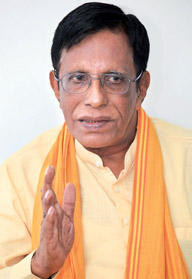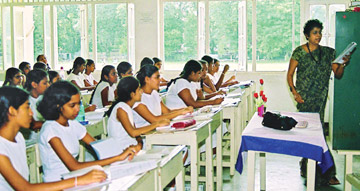‘From Dethroning English to Planning for a Trilingual Society’
Language and Social Process in Sri Lanka 1956 - 2011
:
Keynote Address by Sunimal Fernando at the
9th International Language and Development Conference on ‘Language and
Social Cohesion’ on October 18, 2011 in Colombo
President Mahinda Rajapaksa senses the
people’s perceptions on language
 |
|
Sunimal
Fernando |
President Rajapaksa’s policy in relation to Sinhala and Tamil evolved
while the last phase of the war against terrorism was being fought in
the first decade of this century. He had politically sensed a deep
desire on the part of both the Sinhala and Tamil speaking people to
learn each other’s language, communicate effectively across the lines of
ethnicity, language and location, know each other, understand each other
and integrate with one another.
This is not surprising in a country where the different communities
though distinct in terms of language, religion and ethnicity share much
in the way of lifestyle, values, customs and rituals. Sensing the mind
of the people of all communities, President Rajapaksa while declaring
2009 the Year of English and IT courageously declared that his vision
for Sri Lanka was that of a trilingual society in which the Sinhala and
Tamil speaking people will relate to one another in each other’s
language while English will be a life skill for occupation, employment
and to access knowledge from the outside world.
Moving away from English as the link language to a linking to each
other through each other’s language
By implication we see the country moving away from the older
perception of English as a language that links the Sinhala and Tamil
speaking people of the country: English as a link language. As it is
estimated that even today in 2011 only about 10 percent of our people
are able to work in English, we should not be surprised to find the
country losing confidence in the ability of English to function as a
link language between our two linguistic communities. President
Rajapaksa is therefore moving the country towards an arrangement in
which the two linguistic communities link to each other bilingually, by
learning each other’s language.
People’s urge for integration through language
The Socio-Linguistic Survey of Sri Lanka which was conducted by an
independent research organization for the Presidential Secretariat in
August 2010 proved the correctness of the President’s perception.
According to this survey conducted across the country, between 80
percent and 96 percent of Sinhala, Tamil and Muslim people living in
both majority Sinhala and majority Tamil speaking areas expressed a
strong desire both for themselves and their children to be conversant in
both national languages. The reasons given by them were not of a
material or utilitarian order but of an integrative nature - to be able
to communicate, understand, appreciate and integrate with each other.
The vast majority of respondents from a diversity of age and
occupational groups even went to the extent of expressing a desire to
live in mixed communities and send their children to bilingual rather
than monolingual schools.
Why learn the other’s Language? - The people provide the answer
The results of the Socio-Linguistic Survey of 2010 speak for
themselves. They confirm the perception that in most South Asian
cultures the desire to learn languages is not provoked by factors that
are purely utilitarian in nature. According to the results of the
Socio-Linguistic Survey, the reasons are integrative in nature -
propelled by a desire to explore and integrate with another culture that
one wants to know and understand. While this is the ground reality in
Sri Lanka, it is sad to find urban intellectuals applying Western
intellectual categories to what is essentially a Sri Lankan situation
and asking a culturally alien question, namely - what material benefit
is there for a Sri Lankan to waste his or her time learning the second
national language.
Sinhala and Tamil - markers of identity and vehicles of interaction
The Socio-Linguistic Survey of August 2010 also makes it abundantly
clear that the Sinhala and Tamil speaking people of the country in their
vast majority clearly desire the development of the national languages,
Sinhala and Tamil, as the languages of discourse, discussion and
communication in the country. It is not their wish that English should
grow at the cost of Sinhala and Tamil or that English should be
developed in a manner in which it becomes the instrument of an English
speaking elite that alienates itself progressively from the mainstream
of Sinhala and Tamil life to identify itself - as in the past - with the
cultural, economic and political interests of foreign countries.
Collective development of languages: The vision of President
Rajapaksa
 |
|
Learning
English can be fun |
The vision of President Rajapaksa for a trilingual Sri Lanka and the
perceptions of the people on the manner in which Sinhala, Tamil and
English should relate to each other in a trilingual setting, form the
building blocks on which the Ten Year National plan for a Trilingual Sri
Lanka (2012 - 2021) has been constructed. It is proposed in the Plan
that the Ten Year Trilingual Project should be placed directly under the
President: And that it should be steered at a national level through two
new overarching institutions, the Language Agency of Sri Lanka (LASL)
and the National Agency for Language Research and Training (NALRT) that
should function under the Presidential Secretariat and be implemented
through the relevant institutions that come under the line ministries.
English to be delivered only in a Trilingual setting
However Sri Lanka still has its share of elitist language planners,
confined almost exclusively to Colombo society. While being insensitive
to the aspirations of the people, they continue to lobby for a revival
of English as a differentiator for the elites. It is therefore necessary
to state with clarity that it is our view that in the socio-political
context of our country English skills can never grow and be disseminated
successfully as a stand-alone activity. English can develop only in
association with a parallel development, enrichment and dissemination of
Sinhala and Tamil language skills. Sinhala and Tamil cannot in any way
be the victim of an English language drive as that will be
socio-politically unsustainable and disruptive. Sinhala and Tamil should
be - as our mother tongue languages - and will most certainly continue
to be the languages of discourse, discussion, debate and intellectual
interaction in the country.
Liberating knowledge from the clutches of language
Thus if we are to move towards a knowledge society as required by
government policy, knowledge has to be liberated from the clutches of
language. In a country where only around 10 percent of the people can
work in English and resource constraints and other factors will not
permit too swift a drive towards islandwide English proficiency, we
cannot allow knowledge that is imprisoned within the English language to
remain inaccessible to 90 percent of the people even in the short run.
Making knowledge available in Sinhala and Tamil - a state
responsibility
Therefore as listed in the Ten Year National Plan for a Trilingual
Sri Lanka, sharply focused Sinhala and Tamil language development
programmes and large scale translation programmes will enable knowledge
in all modern subjects of science and technology, medicine, economics,
management, law and governance systems and a host of other subjects to
be available in Sinhala and Tamil in addition to English.
Sinhala and Tamil would be the languages in which the vast majority
will continue to function for very many decades to come. Therefore it is
the responsibility of the State to make knowledge available to them in
the language used by them. If they feel their interests are threatened
by a politically insensitive and forceful drive for English
dissemination thereby neglecting the development of Sinhala and Tamil as
has happened on past occasions, they will very rightly act politically
and make the English drive a failure, even to the detriment of some of
their own interests.
English can only grow on the lap of Sinhala and Tamil
Socio-politically therefore, English can never grow and prosper on
its own in Sri Lanka. It can do so only on the lap of Sinhala and Tamil
in a strictly trilingual setting. If English is to be socio-politically
sustainable, it must in actual fact be packaged together with Sinhala
and Tamil. In other words Sinhala and Tamil have to be developed,
enriched and delivered as the country’s primary languages of discourse
and interaction. This is a fundamental of the Ten Year National Plan.
English on the other hand should be advocated at a different level.
English must be promoted as a culturally neutral life skill for
occupation, employment and for accessing knowledge from the outside
world.
The packaging of English in cohort with Sinhala and Tamil: a design
component of the new plan
Such a packaging of English in cohort with or as an associate
language to Sinhala and Tamil is in a sense what is being designed in
the Ten Year National Plan for a Trilingual Sri Lanka which the
President is expected to launch later this year. The Trilingual
Initiative has been thus drafted with sensitivity to the socio-political
dimensions of language use, practice and identity in Sri Lanka.
Sociologically speaking the dissemination of English, in the context of
the Ten Year National Plan for a Trilingual Sri Lanka is packaged in
conjunction with a parallel development and enrichment of Sinhala and
Tamil as the country’s undisputed languages of discourse and
interaction. Only an approach such as this will give English a stable
and lasting though not dominant place in the language landscape of our
country.
|



